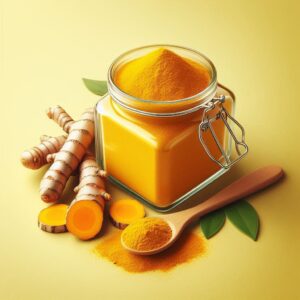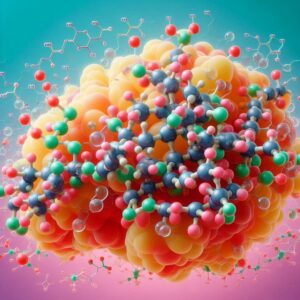The pursuit of enhanced cognitive function and memory retention has led many to explore the benefits of natural supplements. Key natural enhancers such as Ginseng, Ginkgo Biloba, Bacopa Monnieri, Lion’s Mane, Curcumin, Caffeine, and Phosphatidylserine have garnered attention for their cognitive benefits. This article examines these supplements in detail, reviewing scientific studies highlighting their potential roles in improving mental clarity and supporting overall brain health. By understanding how these natural substances work, individuals can make well-informed choices about incorporating them into their health routines to boost cognitive function and protect against cognitive decline.
I. Ginseng & Ginkgo Biloba: Boost Memory & Cognition.

Ginseng and Ginkgo Biloba are renowned herbal supplements that have been extensively studied for their potential benefits in improving memory and cognitive function. This section explores the mechanisms through which these supplements enhance brain health, backed by scientific research.
1. Ginseng and Its Memory Benefits:
Ginseng, particularly Panax ginseng, is a staple in traditional Chinese medicine, known for its broad range of health benefits. Ginseng enhances cerebral circulation, which is crucial for brain health. Increased blood flow delivers essential nutrients and oxygen to brain cells, supporting cognitive functions like memory and concentration, and also helps clear metabolic waste and toxins from the brain. Additionally, Ginseng has been shown to elevate key neurotransmitters such as dopamine, serotonin, and acetylcholine, which play significant roles in mood regulation, memory formation, and overall cognitive function. By maintaining higher levels of these neurotransmitters, Ginseng supports mental clarity and memory retention. Furthermore, Ginseng contains ginsenosides, active compounds with neuroprotective properties that help reduce oxidative stress and inflammation in the brain, linked to cognitive decline and neurodegenerative diseases. This protective effect benefits both healthy individuals and those suffering from conditions like Alzheimer’s disease.
2. Ginkgo Biloba and Its Role in Memory Enhancement:
Ginkgo Biloba is another ancient herb known for its cognitive benefits. Its unique properties make it a powerful supplement for memory improvement. Ginkgo Biloba improves blood circulation, particularly to the brain, ensuring a steady supply of oxygen and nutrients essential for brain health. Enhanced circulation also aids in removing harmful substances that can impair cognitive function. Rich in antioxidants, Ginkgo Biloba protects brain cells from damage caused by free radicals, helping to maintain cell health and prevent cognitive decline associated with aging and neurodegenerative diseases. Additionally, Ginkgo Biloba influences neurotransmitter systems, particularly those involving acetylcholine, which is crucial for memory and learning. By modulating these neurotransmitters, Ginkgo Biloba can improve various aspects of cognitive performance, including memory, attention, and processing speed.
3. Combined Effects of Ginseng and Ginkgo Biloba on Memory:
Studies suggest that the combination of Ginseng and Ginkgo Biloba may have a synergistic effect on cognitive function. When used together, these supplements enhance memory, attention, and overall mental performance more effectively than when used separately. Research involving healthy volunteers has demonstrated that taking both supplements together leads to significant improvements in memory quality and cognitive performance. This combination is especially beneficial for tasks requiring high mental demand and for managing stress, which can negatively impact cognitive function.
II. Bacopa Monnieri and Its Memory Benefits:

Bacopa monnieri, also known as Brahmi, is a renowned herb in traditional Ayurvedic medicine, widely studied for its potential cognitive benefits, particularly in enhancing memory. Here’s an in-depth look at how Bacopa Monnieri supports memory and cognitive function:
1.Boost Brain Function, Reduce Stress, Enhance Memory:
Bacopa Monnieri contains active compounds known as bacosides, which play a crucial role in enhancing brain function. These compounds help improve the growth and function of nerve endings, vital for memory and cognitive performance. By promoting dendritic growth, Bacopa Monnieri enhances synaptic communication, supporting better memory retention and recall. Additionally, Bacopa Monnieri is rich in antioxidants that help combat oxidative stress by neutralizing free radicals. This neuroprotective property maintains the health of brain cells, reducing the risk of memory loss and other cognitive impairments associated with aging and diseases like Alzheimer’s.
2. Modulate Neurotransmitters, Reduce Inflammation:
Bacopa Monnieri has been shown to influence the levels of neurotransmitters such as serotonin, dopamine, and acetylcholine. These neurotransmitters are essential for mood regulation, memory formation, and overall cognitive function. By maintaining balanced levels of these chemicals, Bacopa Monnieri supports mental clarity, focus, and memory. Moreover, Bacopa Monnieri has potent anti-inflammatory properties that help reduce inflammation in the brain, protecting against cognitive decline and improving overall brain health.
3. Boost Brain Plasticity: Clinical Memory Benefits:
Brain plasticity, or neuroplasticity, is the brain’s ability to reorganize itself by forming new neural connections throughout life. Bacopa Monnieri enhances brain plasticity by increasing the production of brain-derived neurotrophic factor (BDNF), a protein that supports the growth and survival of new neurons. This enhancement improves learning and memory, making it easier to retain and process new information. Several studies have demonstrated the efficacy of Bacopa Monnieri in improving cognitive function and memory. For example, a randomized controlled trial found that Bacopa Monnieri significantly improved memory performance in older adults. Another study showed that Bacopa Monnieri supplementation led to improvements in cognitive flexibility and processing speed, particularly in tasks requiring high mental demand.
III. Hydne Hérisson (Lion’s Mane) and Its Memory Benefits:

Hydne Hérisson (Lion’s Mane), scientifically known as Hericium erinaceus, is a medicinal mushroom that has gained attention for its potential cognitive benefits, particularly in enhancing memory.
1. Boost Brain Function, Reduce Inflammation, Improve Memory:
Lion’s Mane mushrooms contain compounds that stimulate the growth of brain cells. These compounds promote neurogenesis, the process of forming new neurons, and enhance synaptic plasticity, which improves the brain’s ability to form and reorganize synaptic connections. This is particularly important for learning and memory retention. Studies have shown that Lion’s Mane can significantly increase the size of growth cones in neurons, helping them to establish new connections. Additionally, Lion’s Mane has potent anti-inflammatory properties that help reduce inflammation in the brain. By decreasing inflammation, it protects brain cells from damage and supports overall brain health, which is crucial for maintaining memory and cognitive function over time.
2. Boost Neuroprotection and Brain Plasticity for Better Memory:
Lion’s Mane contains hericenones and erinacines, compounds known to stimulate the production of nerve growth factor (NGF). NGF is essential for the growth, maintenance, and survival of neurons. By boosting NGF levels, Lion’s Mane helps repair and regenerate neurons, enhancing memory and protecting against neurodegenerative conditions. This neuroprotective effect is vital for both preventing memory loss and improving cognitive function. Moreover, Lion’s Mane enhances brain plasticity by promoting the growth of new neurons and strengthening existing neural connections. This adaptability is crucial for learning new information and retaining memories. Enhanced plasticity supports cognitive resilience and can help mitigate the effects of aging on the brain.
3. Clinical Evidence on Memory Benefits: Lion’s Mane Impact.
Research on the cognitive benefits of Lion’s Mane is promising. Preclinical studies have shown that Lion’s Mane can significantly improve memory and cognitive performance by promoting brain cell growth and reducing inflammation. These effects are particularly beneficial for conditions like Alzheimer’s and other forms of dementia, where neurodegeneration and cognitive decline are prevalent. For instance, a study by the University of Queensland demonstrated that the active compounds in Lion’s Mane promote neuron projections, which are crucial for brain cells to establish new connections.
IV. Curcumin and Its Memory Benefits:

Curcumin, the active compound in turmeric, has garnered significant attention for its potential cognitive benefits, particularly in enhancing memory.
1. Boost Brain Function and Reduce Inflammation for Memory:
Curcumin improves memory by promoting brain function in several ways. It enhances the production of brain-derived neurotrophic factor (BDNF), a protein that supports the growth, maintenance, and survival of neurons. Higher levels of BDNF are associated with improved cognitive functions, including memory and learning. Additionally, curcumin has powerful anti-inflammatory properties that help reduce inflammation in the brain. By inhibiting pathways like NF-κB, curcumin decreases the production of inflammatory molecules, protecting brain cells from damage and supporting long-term cognitive health.
2. Antioxidants & Amyloid-Tau for Memory:
Curcumin is a strong antioxidant that neutralizes free radicals, reducing oxidative stress and preventing damage to brain cells. This action helps maintain the integrity of neurons, supporting memory retention and reducing the risk of cognitive impairment associated with aging. Moreover, curcumin impacts the accumulation of amyloid plaques and tau tangles, hallmark features of Alzheimer’s disease. Studies have shown that curcumin can reduce the levels of these proteins in the brain, potentially slowing the progression of Alzheimer’s and improving cognitive functions, including memory. This reduction in amyloid and tau accumulation helps protect the brain’s structure and function, crucial for maintaining memory.
3. Clinical Evidence: Memory Benefits of Curcumin.
Numerous studies have demonstrated the efficacy of curcumin in improving memory. For instance, a study by UCLA found that individuals taking a bioavailable form of curcumin showed a 28% improvement in memory performance over 18 months, compared to those taking a placebo. These participants also exhibited less amyloid and tau accumulation in brain regions associated with memory and emotional functions. Such findings highlight curcumin’s potential as a valuable supplement for cognitive health and memory enhancement.
V. Caffeine and Its Memory Benefits:

Caffeine is a familiar ally in the battle against drowsiness, yet its influence extends beyond mere alertness, particularly enhancing our memory processes.
1. The Mechanism of Caffeine’s Effect on Memory:
Caffeine, a widely consumed stimulant, enhances memory by interfering with adenosine, a neurotransmitter that promotes sleep and relaxation. By blocking adenosine receptors, caffeine increases the levels of other neurotransmitters such as dopamine and norepinephrine, which are associated with arousal, vigilance, and cognitive functions. This neurochemical interaction boosts alertness and cognitive performance, including memory retention and recall.
2. Research Findings on Caffeine and Long-term Memory:
Recent studies highlight caffeine’s role in improving long-term memory. A notable study by Michael Yassa and his team at Johns Hopkins University demonstrated that consuming 200 milligrams of caffeine after a learning session significantly enhanced memory consolidation. Participants who took caffeine were better at recognizing similar but not identical images in a memory test 24 hours later. This improved pattern separation a crucial aspect of long-term memory suggests that caffeine strengthens the ability to retain and differentiate memories over time.
3. Optimal Doses and Timing for Memory Enhancement:
The memory-boosting effects of caffeine are dose-dependent, with 200 milligrams being the optimal amount for enhancement. Lower doses, such as 100 milligrams, are less effective, while higher doses, like 300 milligrams, do not provide additional benefits and may even reduce effectiveness. Furthermore, consuming caffeine after a learning activity rather than before is more effective for memory consolidation. This strategy ensures that the cognitive benefits are attributed to enhanced memory retention rather than increased attention or focus during the learning process.
VI. Phosphatidylsérine and Its Memory Benefits:

Phosphatidylserine (PS) is a vital component of brain health, known for its profound impact on memory and cognitive function.
1. The Role of Phosphatidylserine in Brain Health:
Phosphatidylserine (PS) is a phospholipid, a type of fat that is crucial for the structure and function of cell membranes, especially in the brain. It plays a pivotal role in maintaining cell membrane integrity, fluidity, and the efficient functioning of neural cells. This balance is essential for optimal communication between neurons, which is critical for memory formation and retrieval.
Phosphatidylserine helps maintain membrane fluidity, allowing for better nutrient transport and waste removal within brain cells. It supports the health of neurons by protecting them from oxidative stress and inflammation, which can lead to cell damage and cognitive decline. By maintaining healthy cell membranes, phosphatidylserine ensures that neurons can efficiently transmit signals, which is fundamental for cognitive processes, including memory.
2. Impact on Neurotransmitter Systems:
Phosphatidylserine significantly influences the brain’s neurotransmitter systems, which are vital for mood, cognition, and memory. It enhances the production and release of key neurotransmitters such as dopamine and acetylcholine. Dopamine is crucial for motivation and mood regulation, while acetylcholine is essential for memory and learning. By boosting these neurotransmitters, phosphatidylserine can improve cognitive functions and memory recall.
Moreover, phosphatidylserine helps regulate cortisol, the stress hormone. High cortisol levels can impair cognitive functions and memory. Phosphatidylserine’s ability to lower cortisol levels helps reduce stress, thereby protecting cognitive health and enhancing memory retention.
3. Memory Enhancement Research: Impact of Phosphatidylserine.
Several studies have highlighted the memory-boosting effects of phosphatidylserine. Research shows that supplementation with phosphatidylserine can improve memory performance, especially in elderly individuals experiencing age-related cognitive decline. For instance, a study found that elderly participants who took phosphatidylserine showed significant improvements in short-term recall and overall learning abilities compared to those who took a placebo.
Phosphatidylserine has also been shown to enhance memory by supporting neuroplasticity, the brain’s ability to adapt and form new neural connections. This is crucial for learning and memory consolidation. By promoting dendritic growth, phosphatidylserine helps the brain form new synaptic connections, making it easier to retain and recall information.
Overall, phosphatidylserine is a promising supplement for boosting memory and cognitive health, especially in aging populations. Its multifaceted role in maintaining cell membrane integrity, regulating neurotransmitter systems, and enhancing neuroplasticity makes it a valuable asset in supporting memory and overall brain health.
Conclusion:
Exploring the effects of natural supplements on cognitive enhancement has opened new avenues for those looking to naturally support brain function and memory. The natural supplements discussed here Ginseng, Ginkgo Biloba, Bacopa Monnieri, Lion’s Mane, Curcumin, Caffeine, and Phosphatidylserine offer promising benefits for cognitive health and mental clarity. Incorporating these supplements should be considered as part of a broader approach that includes healthy lifestyle choices and a balanced diet. As research evolves, it will continue to shed light on how these supplements can be best used to maintain cognitive performance and resilience throughout life.

